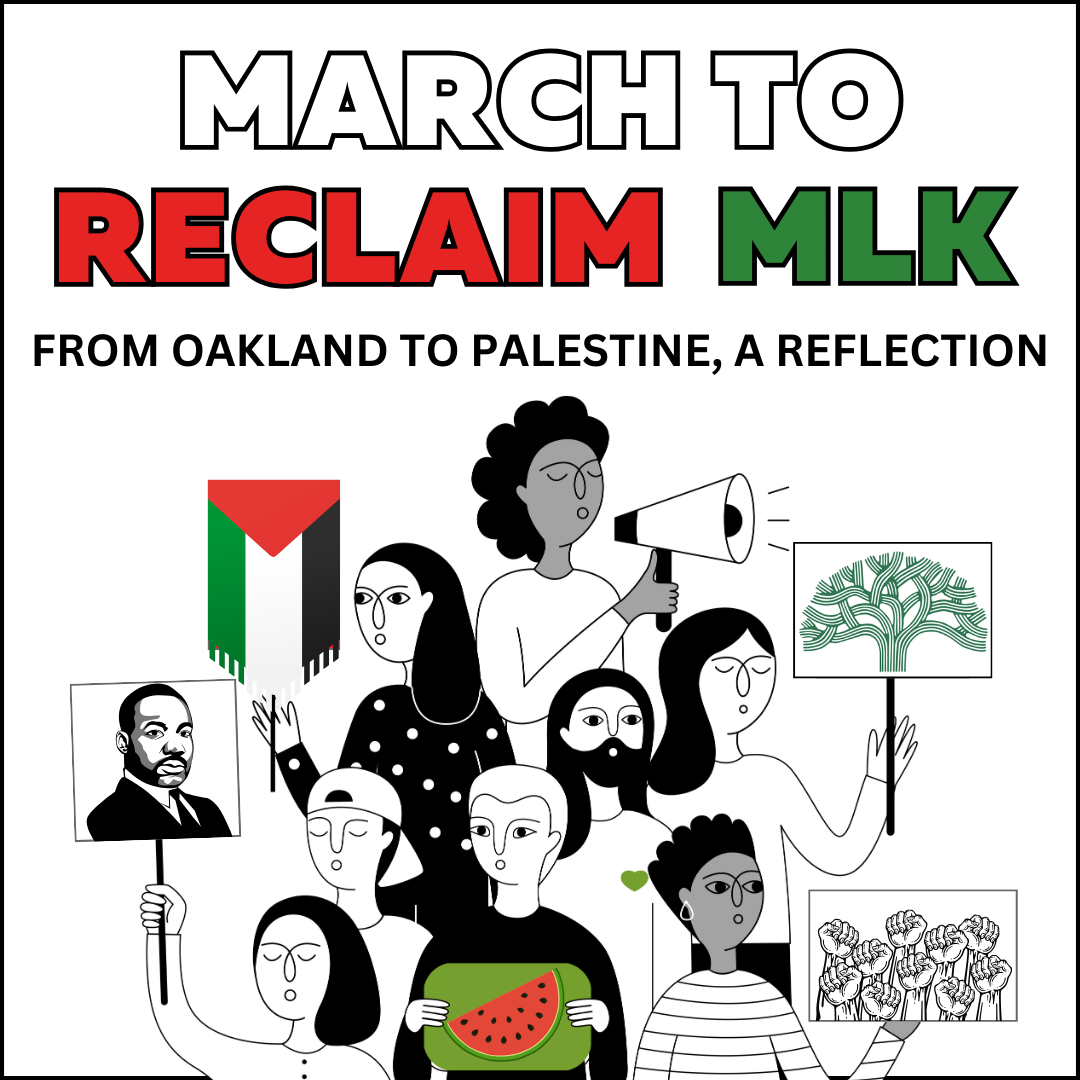
March to Reclaim MLK: From Oakland to Palestine, a Reflection
by Kiran Palla
On January 15th, in celebration of Martin Luther King Jr. Day, I joined thousands of Bay Area residents at the Anti Police-Terror Project’s 10th Annual March to Reclaim MLK’s Radical Legacy. Local leaders, activists, and community members gathered to celebrate the legacy of Martin Luther King Jr. and call for systemic change.
The demands of the demonstration were:
- An immediate ceasefire, end US aid to Israel, and liberation of the Palestinian homeland
- Immediately house the over 8,000 people sleeping on Oakland’s streets
- Peace on our streets and healing for our communities, recognizing that all violence is state violence
- End our partnership with the California Highway Patrol
- Accountability for killer cops
- No surveillance of Oaklanders — cancellation of automated license plate reader projects
- Defund OPD like city council promised and invest in community services and programs
- Exponentially expand the following programs in 2024: Community Ambassadors, MACRO, Violence Interruption, Youth Services, Traffic Calming (Pedestrian Safety)
(adapted from APTP)
At first glance, it might seem odd to see demands for Palestinian liberation on the same list as local Oakland city demands. But the truth is our struggles are intertwined. There is a long history of marginalized communities in the United States standing in solidarity with Palestine. This is especially true in Oakland, where members of the Black Panther Party were calling for Palestinian liberation as early as 1967. In 1970, Eldridge Cleaver gave a speech on the topic at the Pan-African Cultural Festival where he also met with Yasser Arafat.1 The subsequent statement released by the Black Panther Party left no room for debate on their stance.
“We support the Palestinians’ just struggle for liberation one hundred percent. We will go on doing this, and we would like for all of the progressive people of the world to join in our ranks in order to make a world in which all people can live.” 2
Just as the Black Panther Party understood the ties between liberation movements in 1970, Bay Area activists understand this connection today. When demanding funding for community programs, it’s critical to call out how our tax dollars are being spent on pointless wars instead. The American government funds the destruction of homes in Gaza while thousands in the Bay Area remain unhoused and unsheltered. Surveillance programs in Palestine have echoes of those we see at home, as the US and Israel compare notes on how best to subjugate marginalized communities3. And decades of over-policing and excessive use of force by law enforcement are sadly a shared reality for Oakland residents and Palestinians.4
Martin Luther King Jr. understood this too.
Most of us are familiar with King’s “I Have a Dream” speech, but fewer of us know about the “Beyond Vietnam” speech he made in 1967. It’s not surprising why. Though today Martin Luther King is universally celebrated as a civil rights leader, at the time, he was relentlessly criticized for his unpopular anti-war stance and calls for a ceasefire in Vietnam.5 Despite this backlash, King did not back down. He saw the hypocrisy of the United States celebrating his approach of non-violence at home while actively enacting extreme violence abroad. In his speech he orated,
“I knew that I could never again raise my voice against the violence of the oppressed in the ghettos without having first spoken clearly to the greatest purveyor of violence in the world today — my own government.” 6
Revisiting “Beyond Vietnam”, it is not hard to imagine what Dr. King might have said about the genocide in Gaza today. In the same way that he spoke out for the people of Vietnam, I believe he would have raised his voice for the people of Palestine.
Last weekend, many of us across the country and around the world raised our voices for Palestine. As I looked around at the March to Reclaim MLK’s Radical Legacy, I was struck by how thousands of people from diverse backgrounds and experiences had come together to call for the liberation of Palestine, even from thousands of miles away. Seeing the family of Oscar Grant attend, hearing from unhoused activists who showed up for Palestine despite all the struggles they themselves face, watching mothers carry their infants in one arm and a megaphone in the other, I can’t help but think that this is the true legacy of Martin Luther King Jr. Not a static symbol like a statue or street named after him, but a day of action, a day for resistance. And so, let us live like it’s MLK Day every day, until all our people are free – from Oakland to Falasteen.
Sources
2 https://tribunemag.co.uk/2023/05/from-panthers-to-palestine
4 https://policescorecard.org/ca/police-department/oakland#
5 https://kinginstitute.stanford.edu/encyclopedia/beyond-vietnam
6 https://www.americanrhetoric.com/speeches/mlkatimetobreaksilence.htm
